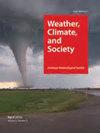Role of Agrometeorological Advisory Services in Enhancing Food Security and Reducing Vulnerability to Climate Change
IF 1.9
4区 地球科学
Q3 ENVIRONMENTAL STUDIES
引用次数: 0
Abstract
Providing knowledge inputs to farmers is critical to reduce their vulnerability and enhance resilience against climate change. In developing countries such as India, where small-holdings and rain-fed agriculture are predominant, knowledge inputs become even more critical. The India Meteorological Department (IMD) is providing integrated agrometeorological advisory services (AAS) to farmers since 2008. In this paper, we estimate the scale of access to AAS and its impact on crop yields in 1000 households across ten villages in two agroclimatic zones in India. We find evidence suggesting that access to AAS can have a significant impact on crop yields in the Kharif (June-September) season while other inputs are more important in the case of Rabi (winter) crops. Specifically, the yields of pigeon pea, soyabean, and pearl millet are higher by 233 kg/ha, 98 kg/ha, and 318 kg/ha respectively for AAS beneficiaries. For the entire study area, this translates to a value addition of $9.66 million for these three crops in one season. Our results show that AAS can be an important contributor to meet the developmental goals of enhancing food security in dryland agriculture and building resilience against climate change.农业气象咨询服务在加强粮食安全和减少对气候变化脆弱性方面的作用
向农民提供知识投入对于减少他们的脆弱性和增强应对气候变化的能力至关重要。在印度等发展中国家,小规模农业和雨水灌溉农业占主导地位,知识投入变得更加重要。自2008年以来,印度气象部(IMD)一直在为农民提供综合农业气象咨询服务。在本文中,我们估计了印度两个农业气候区10个村庄1000户家庭获得AAS的规模及其对作物产量的影响。我们发现有证据表明,在Kharif(6月至9月)季节,获得AAS可以对作物产量产生重大影响,而在Rabi(冬季)作物的情况下,其他投入更为重要。具体而言,AAS受益者的鸽子豌豆、大豆和珍珠小米产量分别提高了233公斤/公顷、98公斤/公顷和318公斤/公顷。对于整个研究区域,这意味着这三种作物在一个季节内增加了966万美元的价值。我们的研究结果表明,AAS可以为实现加强旱地农业粮食安全和建立应对气候变化的能力的发展目标做出重要贡献。
本文章由计算机程序翻译,如有差异,请以英文原文为准。
求助全文
约1分钟内获得全文
求助全文
来源期刊

Weather Climate and Society
METEOROLOGY & ATMOSPHERIC SCIENCES-
CiteScore
3.40
自引率
13.60%
发文量
95
审稿时长
>12 weeks
期刊介绍:
Weather, Climate, and Society (WCAS) publishes research that encompasses economics, policy analysis, political science, history, and institutional, social, and behavioral scholarship relating to weather and climate, including climate change. Contributions must include original social science research, evidence-based analysis, and relevance to the interactions of weather and climate with society.
 求助内容:
求助内容: 应助结果提醒方式:
应助结果提醒方式:


